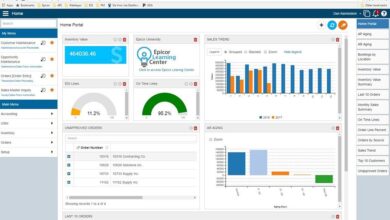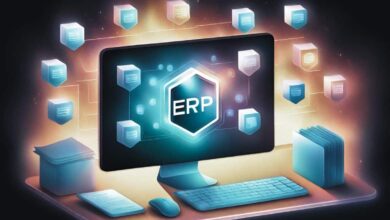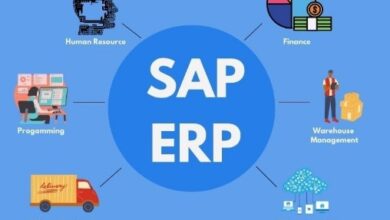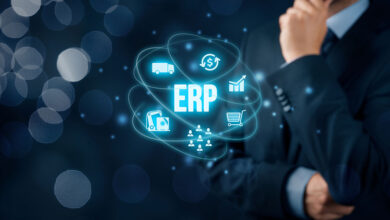Unlocking Business Potential with ERP Software Solutions

In today’s fast-paced and competitive business landscape, organizations are constantly seeking ways to streamline operations, enhance efficiency, and stay ahead of the curve. Enterprise Resource Planning (ERP) software solutions have emerged as indispensable tools for achieving these goals. From small startups to multinational corporations, businesses across various industries are harnessing the power of ERP to optimize processes, drive growth, and maximize profitability.
What is ERP?

ERP software integrates core business processes such as finance, HR, supply chain management, manufacturing, and customer relationship management into a unified system. It provides a centralized database that enables real-time visibility and seamless communication across different departments, facilitating data-driven decision-making and fostering collaboration.
Key Features and Benefits
Streamlined Operations: ERP eliminates silos by integrating disparate systems and automating routine tasks. This streamlines processes, reduces manual errors, and enhances overall operational efficiency.
Improved Planning and Forecasting: With access to accurate and up-to-date data, organizations can make informed decisions regarding inventory management, production scheduling, resource allocation, and demand forecasting, thereby minimizing waste and optimizing resources.
Enhanced Customer Experience: By consolidating customer data and interactions, ERP enables businesses to deliver personalized experiences, anticipate customer needs, and provide timely support, leading to increased satisfaction and loyalty.
Cost Reduction: ERP eliminates redundant processes, reduces paperwork, and enhances resource utilization, resulting in cost savings across the board. Moreover, better inventory management and procurement practices help minimize inventory carrying costs and prevent stockouts.
Regulatory Compliance: ERP systems often come with built-in regulatory compliance features, ensuring that businesses adhere to industry standards and government regulations. This mitigates the risk of non-compliance penalties and legal issues.
Scalability and Flexibility: ERP solutions are designed to grow with the business. Whether expanding into new markets, adding product lines, or acquiring subsidiaries, ERP systems can scale seamlessly to accommodate changing business needs.
Industry Applications
ERP software solutions find applications across various industries, including manufacturing, retail, healthcare, finance, education, and logistics. For example:
- Manufacturing: ERP helps optimize production processes, manage inventory levels, track orders, and ensure quality control.
- Retail: ERP enables retailers to manage sales, inventory, and supply chain logistics efficiently while offering omnichannel shopping experiences.
- Healthcare: Healthcare providers use ERP to streamline patient care, manage medical records, track billing, and comply with regulatory requirements.
- Finance: ERP systems facilitate financial planning, budgeting, accounting, and reporting, enabling organizations to maintain financial health and transparency.
Challenges and Considerations
While ERP software offers numerous benefits, its implementation can pose challenges such as:
Cost: ERP implementation requires a significant upfront investment in software licenses, customization, training, and infrastructure upgrades.
Integration Complexity: Integrating ERP with existing systems and legacy software can be complex and time-consuming.
Change Management: Resistance to change among employees and stakeholders can hinder adoption and impact productivity.
Data Security: Centralized data storage raises concerns about data security, privacy, and compliance with data protection regulations.
The Evolution and Impact of ERP Software Solutions in Modern Businesses
Enterprise Resource Planning (ERP) software solutions have revolutionized the way businesses operate, manage resources, and drive growth. Over the years, ERP systems have evolved from basic accounting tools to comprehensive platforms that integrate and streamline all aspects of business operations. In this article, we’ll explore the evolution, impact, and future trends of ERP software solutions in modern businesses.
The concept of ERP emerged in the 1960s with Material Requirements Planning (MRP) systems designed to manage manufacturing processes. These early systems focused on inventory control and production scheduling. In the 1980s, the term “ERP” was coined to describe software that extended beyond manufacturing to include other functional areas like finance, human resources, and customer relationship management.
As technology advanced, ERP systems became more sophisticated, incorporating features such as real-time data processing, cloud-based deployment, mobile access, and predictive analytics. Today, ERP solutions leverage artificial intelligence (AI), machine learning (ML), and Internet of Things (IoT) technologies to enhance automation, decision-making, and agility.
The Impact of ERP
Operational Efficiency: ERP streamlines business processes by automating tasks, eliminating redundancy, and providing real-time insights. This improves productivity, reduces errors, and accelerates decision-making.
Strategic Planning: ERP systems offer advanced planning and forecasting capabilities, enabling organizations to optimize resource allocation, anticipate market trends, and respond to changing demands swiftly.
Data-driven Insights: By centralizing data from various departments, ERP facilitates data analysis and reporting, empowering businesses to derive actionable insights, identify opportunities, and mitigate risks.
Enhanced Collaboration: ERP fosters cross-functional collaboration by providing a single source of truth for stakeholders across the organization. This improves communication, coordination, and alignment towards common goals.
Customer Satisfaction: ERP enables personalized customer experiences through integrated sales, marketing, and service processes. By understanding customer needs and preferences, businesses can deliver tailored products and services, leading to higher satisfaction and loyalty.
Compliance and Governance: ERP systems help organizations comply with regulatory requirements and industry standards by enforcing data security, audit trails, and internal controls. This mitigates legal risks and enhances corporate governance.
Future Trends in ERP
- Cloud Adoption: More businesses are transitioning to cloud-based ERP solutions for scalability, flexibility, and cost-effectiveness.
- AI and Automation: AI-powered ERP systems will automate routine tasks, predict outcomes, and optimize processes for greater efficiency and competitiveness.
- IoT Integration: ERP will integrate with IoT devices to enable real-time monitoring of assets, predictive maintenance, and supply chain optimization.
- Blockchain Technology: Blockchain integration in ERP systems will enhance data security, transparency, and traceability across supply chains and financial transactions.
- Vertical-specific Solutions: ERP vendors will develop industry-specific solutions tailored to the unique needs of sectors like healthcare, retail, manufacturing, and finance.
In conclusion, ERP software solutions continue to evolve and play a pivotal role in shaping the future of businesses worldwide. By embracing innovation, harnessing data-driven insights, and fostering collaboration, organizations can leverage ERP technology to drive growth, adapt to change, and stay ahead in the digital era.
Conclusion
In conclusion, ERP software solutions play a vital role in driving operational efficiency, fostering innovation, and enabling business growth in today’s dynamic marketplace. By providing a unified platform for managing core business processes, ERP empowers organizations to adapt to change, capitalize on opportunities, and stay ahead of the competition. However, successful implementation requires careful planning, stakeholder engagement, and ongoing support to realize the full potential of ERP technology.




